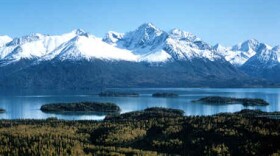Lonnie Khmelev owns Affordable Auto Sales in Juneau, and until last week, he got all of his EVs shipped through Alaska Marine Lines. That’s true for all of the car dealerships in Juneau. Khmelev currently has 50 cars on the lot and nearly half are EVs.
“I would say we sell probably about 40% EV,” he said.
But AML stopped shipping electric vehicles to Alaska at the beginning of September due to the fire risk posed by lithium ion batteries. This came after two other major shipping companies Matson and Tote Maritime suspended their EV shipments to the state for the same reason.
Khmelev said he’ll probably ship EVs on the ferry, which has a limit of two at a time.
“I do think that we're going to continue selling EVs, and we'll find ways to get them here and ship them out if need be,” he said. “I'm staying positive on that.”
Because his operation is small, Khmelev said getting just a few cars in per week is plenty.
But down the road at the Juneau Auto Mall, the largest dealership in town, Manager Kody Richardson is less optimistic.
“Without a detailed workaround to get cars here, it will definitely affect our ability to grow EV sales in Southeast Alaska,” he said.
Richardson said EVs have made up less than 5% of the company’s sales so far this year, but even that demand may be hard to keep up with.
AML didn’t agree to an interview for this story, spokesperson Ryan Dixon wrote in an email that the company still ships hybrid vehicles that don’t plug in, and will reassess its ability to safely ship EVs and plug-in hybrids as industry standards and safety procedures improve.
The decision came after a cargo ship carrying electric, hybrid and standard vehicles caught fire and burned for days before sinking off the coast of Adak in June. All Twenty-two crewmembers evacuated on a lifeboat and were rescued by another vessel.
Steve Behnke leads Renewable Juneau, a non-profit that advocates for clean energy. He said he hears the shipping companies’ safety concerns, but “as we understand it, the circumstances are just totally different in terms of the shipping that AML is doing,” he said. “They're using open barges. They're not cramming a bunch of vehicles down in the hold of a cargo ship.”
Behnke said EVs make good sense for Alaska’s capital city, which runs on relatively cheap hydroelectric power, has a small network of roads and a moderate climate that isn’t rough on the car batteries.
“Juneau is a Goldilocks zone for EVs,” he said.
It’s unclear if car dealerships are facing the same problem in the rest of the state. A handful of dealerships in Anchorage didn’t respond to interview requests for this story. But anecdotally, it may be harder to buy an EV in the state’s largest city. Anchorage resident Maggie Miller ran into roadblocks when she explored buying one in August.
Miller’s teenage son totaled the family’s 2013 Toyota Highlander while learning to drive.
“We had been intending to buy an EV next fall when he turned 16,” she said. “So when this total happened, we were like, well, maybe we should go ahead and get the EV.”
The Millers called Continental Subaru to see about the Solterra. That’s when they heard that the dealership can’t get them because shipping companies won’t transport EVs to Alaska anymore.
Miller said she was surprised.
“I was really disappointed, because I just understood this was something we were trying to do as a country,” she said. “We were trying to make a change and it's something that we totally can support.”
Miller’s often shuttling her two kids and nephews to their sports and other activities, and needed a car to replace the totaled one. So she ended up just buying another gas-powered Highlander.
“It's just a bummer that there's…improvements in technology, but there are all these barriers to taking the steps to do the right thing,” she said.
Miller said that she hopes dealerships can find a way to get EVs to Anchorage, either with additional charging stations on the Alcan Highway or a change in shipping policy.






